Posted January 15, 2021 by Nicky in Reviews / 0 Comments
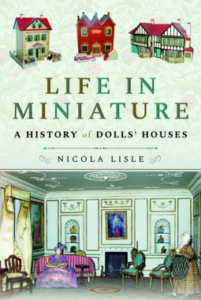 Life in Miniature, Nicola Lisle
Life in Miniature, Nicola Lisle
Received to review; published November 23rd 2020
Life in Miniature is a bit of a survey of dolls’ houses, mostly a descriptive one, which talks about some key examples in order to illustrate trends over the years, and ends with a chapter of advice for those interested in collecting dolls’ houses themselves. I’m not; I was more interested in this as a microhistory, and it does do a little of that, discussing the things dolls’ houses stood for, for those who owned them, and how trends developed.
For me, though, it was a bit too much plain description, too many descriptions of particular houses rather than the higher-level trends. Maybe there isn’t more to analyse about dolls’ houses, or the style is different to other microhistories I have loved… but it just didn’t turn out the way I hoped.
That said, if you’re a big fan of dolls’ houses and you’d like to know more about what’s out there, this book would be a great guide.
Rating: 3/5
Tags: book reviews, books, history, Nicola Lisle, non-fiction
Posted January 12, 2021 by Nicky in Reviews / 0 Comments
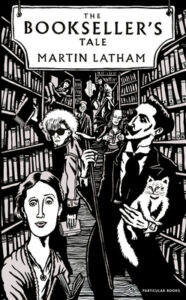 The Bookseller’s Tale, Martin Latham
The Bookseller’s Tale, Martin Latham
I feel like this book wasn’t quite sure what it was. History of the book? History of access to books? History of what people think about books? Autobiography of Martin Latham? There’s some genuinely interesting stuff sandwiched in between Latham making sure we know that he worked for Tim Waterstone and knew a bunch of famous people before you could Google them. Sometimes his anecdotes work to illustrate the narrative he’s trying to spin… and sometimes he’s telling us about weird dreams he had.
It was also full of this… reverence for the codex (not the contents) as a physical object, and being passionately in love with the physical form of a book. He’s a fan of physical books you can fondle, annotate, spill things on, write your name in… And I can get it, to some extent, but you’d think people aren’t real readers if they don’t like to caress books or crease spines or whatever. He does bring across the sensual enjoyment of books, and what a delight that can be for some people, but, yeah, just not sure about this absolute lionising of the codex-form of books above all else, above even the contents (which he rarely discusses in detail).
I expected to love this, but found myself fairly nonplussed. Overall, I can’t say I really enjoyed it — something about Latham and me just didn’t click, for a start.
Rating: 2/5
Tags: book reviews, books, history, Martin Latham, non-fiction
Posted January 5, 2021 by Nicky in Reviews / 0 Comments
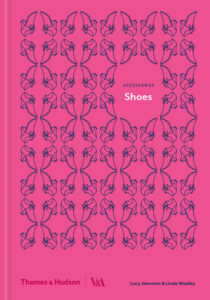 Accessories: Shoes, Lucy Johnston, Linda Wooley
Accessories: Shoes, Lucy Johnston, Linda Wooley
As with Accessories: Bags, this book caught my interest less because I have an inherent interest in the subject, or even fashion more generally, but because it suits my current rabbit-hole interest. I was here for the titbits about why certain shoes went hand-in-hand with certain dress fashions, and the book certainly had plenty of that kind of titbit — like the fact that the very long points of shoes like poulaines were somewhat eschewed by women at the time; they just weren’t practical and would tangle in the long hem-lines of dresses.
The book is beautifully presented with full-colour photographs/reproductions of art, and it’s structured well as a chronological dash through shoe fashion. It’s much better about women’s fashions than men’s (which is not, of course, because women have always had the reputation for being obsessed with their shoes — I refer you to top boots and Hessians, not to mention the aforementioned poulaines!) because of a survival bias in the existing shoes, and it is much stronger on more recent shoes… which are perhaps least interesting to me.
Definitely interesting, and one I’d recommend if you’re interested in the subject.
Rating: 4/5
Tags: book reviews, books, history, non-fiction
Posted January 4, 2021 by Nicky in Reviews / 2 Comments
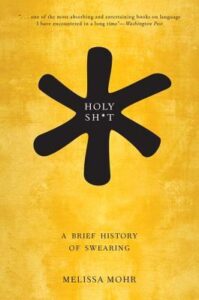 Holy Shit: A Brief History of Swearing, Melissa Mohr
Holy Shit: A Brief History of Swearing, Melissa Mohr
Sorry, that really is the title of the book! And it’s kind of central to Mohr’s premise: that there are two axes of swearing, the ‘Holy’ and the ‘Shit’… or the profane and the obscene, or swearing and cursing — however you best see the distinction between “for God’s sake” and “for fuck’s sake”. She sets this up by discussing various different cultures (all familiar to a Western audience), starting with the Romans and Greeks (mostly the Romans), then moving to the development of Judaism and the rising importance of oath-taking… and then round the full circle back to obscenity.
It’s a fascinating history, though it really is brief when you consider the potential scope for investigating swearing throughout history. I found the chapter on the Old Testament Yahweh fascinating — Mohr charts the development of monotheism through the way oaths are taken and the importance of oaths in the Old Testament, and it makes a lot of sense. (Reassuringly, it’s also well-sourced, and includes quotations and examples.)
It was slower-going than I thought, when I look at my reading time records, but I found it very absorbing. My only complaint would be that the ending felt rather abrupt, even with the later postscript (which briefly discusses an analysis of swearing on Twitter). Recommended!
Rating: 4/5
Tags: book reviews, books, Melissa Mohr, non-fiction
Posted January 2, 2021 by Nicky in Reviews / 1 Comment
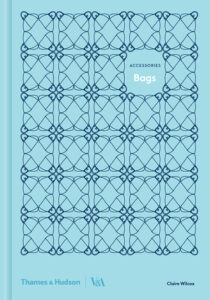 Accessories: Bags, Claire Wilcox
Accessories: Bags, Claire Wilcox
This short volume is from the V&A Museum, discussing the trends in fashion for bags and purses, with a bit of an insight into pockets as well. In many ways it’s a very feminine story, since men retained pockets in clothing and haven’t been such targets of fashion for much of the time. It’s a very Western European history of bags, but nonetheless, it’s interesting to see how they developed and what was considered important or essential in a bag through time. The text is descriptive and refers to items from the V&A collection to illustrate their points, photographed beautifully and carefully labelled to help you match up the two.
I’ll admit, some of these bags are just weird to me, which is an entertainment factor all its own — mostly I mean the newer fashionable ones, like the one which looks like a bag of Walkers crisps. Why?!
Fashion. Apparently.
Rating: 4/5
Tags: book reviews, books, Claire Wilcox, history, non-fiction
Posted December 18, 2020 by Nicky in Reviews / 0 Comments
 Burnout: Solve Your Stress Cycle, Amelia & Emily Nagoski
Burnout: Solve Your Stress Cycle, Amelia & Emily Nagoski
Burnout is a self-help book, so no surprises here: there’s a rather chummy writing style with simplified, bitesize “science” (some of it feeling more dubious than other bits), and there’s a fair bit of colloquial, “relatable” stuff like saying “(ugh)” every time they write the word “patriarchy”. The book is focused on women, or at least people who were assigned female at birth, and throughout it assumes that it’s speaking to women and that women are the only people who would benefit from the advice contained therein. I don’t think that’s true, though I think some aspects of burnout that they discuss tend to impact women more.
There are some interesting ideas and bits of advice in here, and the ways in which it emphasises exercise — or doing some kind of analogue for exercise, like lying down and tensing each muscle sequentially — are fairly doable for anybody, without an undue emphasis on fitness/weight. There’s a section about body positivity which is probably useful for some folks, and which emphasises the ways weight loss is a con.
Overall, I’m probably never going to be a huge fan of self-help books, but this one has useful information and is probably accessible to just about anyone who can put up with the sex/gender assumptions being made. It is probably not going to fix your brain; it certainly didn’t fix mine… but it can offer a useful perspective.
Rating: 3/5
Tags: book reviews, books, non-fiction
Posted December 10, 2020 by Nicky in Reviews / 0 Comments
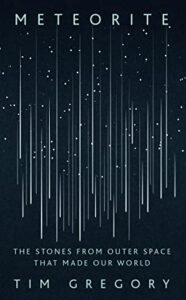 Meteorite: The Stones From Outer Space That Made Our World, Tim Gregory
Meteorite: The Stones From Outer Space That Made Our World, Tim Gregory
Most of the science in this book is not my field at all (some touches on biology a little bit), so I come to this as a complete layperson… and I wasn’t entirely enthused by the idea of a book about meteorites, admittedly — or at least, not sure it would work out to be my kind of book — because it’s not my field, and that’s for a reason! But Tim Gregory writes so clearly and with transparent passion about what he’s doing that I was immediately absorbed. You can tell that he loves his subject, and is eager to communicate it — and he’s a great communicator. You can make any subject boring if you’re not good at writing, and likewise, I think perhaps you can make anything interesting with the right style.
As far as the actual science and history he discusses goes, I’m not really qualified to comment, but everything seemed to hang together and make sense. I didn’t notice anything that jarred against what I actually know or could quickly look up. If you’re interested in space, and in cosmochemistry, then I think this is probably one for you!
Rating: 4/5
Tags: book reviews, books, non-fiction, science, Tim Gregory
Posted December 6, 2020 by Nicky in Reviews / 0 Comments
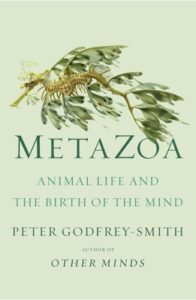 Metazoa, Peter Godfrey-Smith
Metazoa, Peter Godfrey-Smith
I really loved Godfrey-Smith’s Other Minds, so I was expecting something pretty readable and entertaining here. Godfrey-Smith is using the opportunity to dig further into how he thinks minds are formed, and it’s a mixture of science, speculation and philosophy, as was Other Minds. I found, though, that it just didn’t keep my attention very well. It felt like he was taking ages to dig into each point, and like this was a much more self-consciously Serious Book instead of something that shared the wonder and excitement of an animal he loves.
Where he does lean on science, I don’t know anything to his detriment, but it’s not really a field I enjoy very much. I did have a module in my undergrad called “the science of the mind”, but it didn’t really go into this area much at all. There are definitely interesting anecdotes, but sometimes I wanted him to dig into them more — for instance, split brain patients.
A bit disappointing for me, overall, though probably enjoyable for someone who likes grappling with the problem of the evolution of minds.
Rating: 2/5
Tags: book reviews, books, non-fiction, Peter Godfrey-Smith, science
Posted November 16, 2020 by Nicky in Reviews / 0 Comments
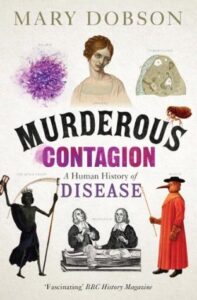 Murderous Contagion: A Human History of Disease, Mary Dobson
Murderous Contagion: A Human History of Disease, Mary Dobson
I’d expected this to be right up my alley, but in the end, it was too general to really serve up the kind of titbits I’m looking for. Each chapter is a pretty high-level summary of the disease, its effects, its place in history and the current state of affairs, and though here and there some snippets were new to me, on the whole it just wasn’t deep enough for me. There’s some sourcing and recommended further reading, which is worth digging into, but it’s very much a layperson’s book.
As a layperson’s book, because of course I’m not a layperson in this field, it’s a pretty good overview of some very important diseases. The section on SARS and MERS is, well, not prophetic, but an intelligent person mentioning a warning they were aware of which we should all have heeded. The information in the book, as far as my own knowledge goes, is correct and interesting, though I wondered now and then if some things might be apocryphal (Albert Szent-Györgyi calling vitamin C “godnose”, for example).
I think the writing style might be a bit dry at times, though. I can’t tell if I thought so because so little of the information was new, or whether it was genuinely boring.
Rating: 2/5
Tags: book reviews, books, history, Mary Dobson, non-fiction, science
Posted November 14, 2020 by Nicky in Reviews / 0 Comments
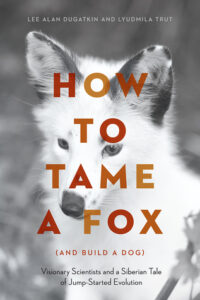 How to Tame a Fox (And Build A Dog), Lee Alan Dugatkin, Lyudmila Trut
How to Tame a Fox (And Build A Dog), Lee Alan Dugatkin, Lyudmila Trut
This book discusses one of the most famous experiments on the domestication of animals: the silver fox experiment, originally conceived by Dmitri Belyaev. Generations of foxes were bred during this experiment, selecting from each generation only the tamest animals… and quickly, the experimenters found the behaviour and appearances of their subjects converging on that of dogs. Floppy ears, curly tails, play behaviour even in adults, interest in humans, affection — even protective behaviour.
This book discusses these experiments and their context (shadowed at the start by Lysenko’s hold on the government, their funding fluctuating according to who was in power), and some of their implications. It discusses the morphological and behavioural changes, picking apart some of the known or hypothesised causes (like differences in levels of hormone production, including melatonin and serotonin).
It doesn’t go into any of the criticism of the project’s far-reaching conclusions, which I’ve been seeing a bit of around now Google knows I’m interested in this subject. For instance, at least one study has suggested that the foxes used in the experiment weren’t wild to begin with; though it was always acknowledged that they were from fur farms (and the descriptions of their behaviour, per the book, certainly don’t make it sound like any tameness had been selected for)… it’s still a confounding variable. The book is wildly positive about the experiments, so it’s worth noting that slant and the fact that the story here definitely isn’t the full story. It’s very much a story, though, including a touching tale from Belyaev’s funeral and snippets about the lives of those who worked with the foxes, so it’s pretty much to be expected.
It’s a very clear and easy to follow read, and I think it would be perfectly fine for a complete layperson, even when it dips into the science. It makes me wonder very much about whether these foxes will become common pets in future.
Rating: 4/5
Tags: book reviews, books, non-fiction, science
 Life in Miniature, Nicola Lisle
Life in Miniature, Nicola Lisle








